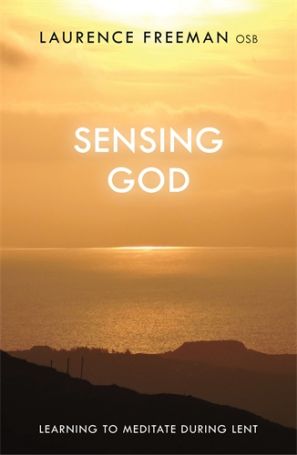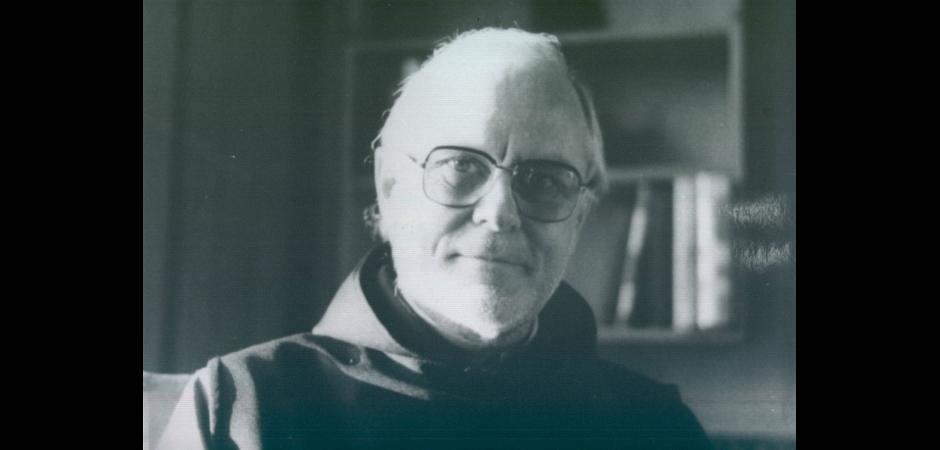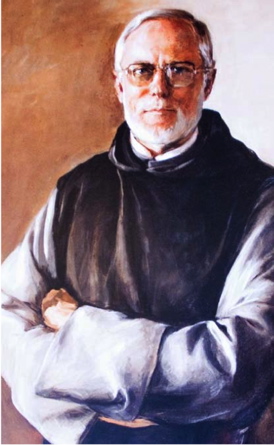 Homily by Laurence Freeman OSB
Homily by Laurence Freeman OSB
(Links to memories at the bottom of this page.)
December 29th 2007
Many are needed to plant the Word and many to water it. The spread of the faith, the increase in population demand this. God’s people in the past who had but one altar still needed many teachers. How much greater now are the needs of the rich gathering of nations, for whose sacrifices Lebanon itself could not provide enough firewood.
If it were not for the reference to Lebanon as a source of firewood we might think that these words of Thomas a Beckett were contemporary. The population of the world is increasing (by 211,000 a day and by the size of Germany every year). The churches are painfully conscious of how they need to plant and water the seed of the living Word of God and how difficult this is proving. We know how many teachers of wisdom we need.
Today we come to this sacred place, one of the mother churches of English Christians to celebrate the life and teaching and continuing influence of one of the teachers of teachers whom the Lord raised up in our time to help meet these urgent needs.
 Homily by Laurence Freeman OSB
Homily by Laurence Freeman OSB
(Links to memories at the bottom of this page.)
December 29th 2007
Many are needed to plant the Word and many to water it. The spread of the faith, the increase in population demand this. God’s people in the past who had but one altar still needed many teachers. How much greater now are the needs of the rich gathering of nations, for whose sacrifices Lebanon itself could not provide enough firewood.
If it were not for the reference to Lebanon as a source of firewood we might think that these words of Thomas a Beckett were contemporary. The population of the world is increasing (by 211,000 a day and by the size of Germany every year). The churches are painfully conscious of how they need to plant and water the seed of the living Word of God and how difficult this is proving. We know how many teachers of wisdom we need.
Today we come to this sacred place, one of the mother churches of English Christians to celebrate the life and teaching and continuing influence of one of the teachers of teachers whom the Lord raised up in our time to help meet these urgent needs.
John Main was born here in London in 1926 but his roots of faith lay deep in the Celtic tradition, an Irishness he treasured as much as the global citizenship he grew into over the years. As a boy he sang the praises of God in this cathedral, as a chorister. In the course of his 56 years he experienced many aspects of life and many roles – student, soldier, diplomat, lawyer, professor and finally he really found himself by losing himself as a monk. And it was as a monk that he discovered the gift of teaching and the particular message that he was given to share –and did share so richly – with his fellow pilgrims.
He understood prophetically the needs and the crisis of modern Christianity – how it needs to sink back into its contemplative roots in order to branch outwards to a world – a world changing so rapidly that even the speed of change has already dislocated and uprooted several generations from their culture and their faith.
He was a man of the tradition but understood tradition in terms of roots and so he was a radical, indeed in his way, a revolutionary religious figure of our time. He read the signs of the times – as a son of the great Council – and saw that the old forms and structures need to be courageously re-visioned and adjusted to the spirituality of the new phase of history we have entered. For him – as for the monks of the Christian Desert he had learned from – this meant rediscovering the power of prayer as a way of personal, interior transformation. It meant seeing that all prayer leads to contemplation which is the ultimate goal of human life.
When the early church confronted the institutions of the pagan world it found it could not convert them. If you pulled down one temple, smashed the statues and killed the priests another temple would be built in another sacred wood and the old rites would be restarted. So – pragmatically and perhaps inevitably – the church changed its policy. Convert the temples into churches, re-hire and retrain the priests, make the old gods into new saints. Merge rather than compete. Thus the rich and wonderful era of Christendom began. But we who live at the end of Christendom may well ask how deep did the actual conversion process go. How well did the seed of the Word actually sink into the soil of the western mind? How is it that this great tradition was so vulnerable to new ideas, to science and technology, so resistant to democracy, individuality and modernity and eventually so helpless in the face of consumerism?
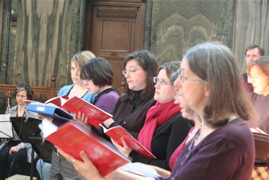 John Main did not wring his hands before the crisis of modern Christianity. He is a powerful figure of hope, a teacher of confidence and courage, because he understood that – in fact – Christianity is not collapsing but shifting into a new and deeper spiritual form. One might almost say it is just beginning. But he saw that its renaissance should not be preoccupied with rescuing or shoring up old failing structures, but, in the words of St Paul whose spirit he resonated so dynamically with, he could say,
John Main did not wring his hands before the crisis of modern Christianity. He is a powerful figure of hope, a teacher of confidence and courage, because he understood that – in fact – Christianity is not collapsing but shifting into a new and deeper spiritual form. One might almost say it is just beginning. But he saw that its renaissance should not be preoccupied with rescuing or shoring up old failing structures, but, in the words of St Paul whose spirit he resonated so dynamically with, he could say,
Adapt yourselves no longer to the pattern of this present world but let your minds be remade and your whole nature thus transformed.
Father John used to say he had only one thing to say. He had the genius of simplicity and was a great communicator of deep ideas, so he condensed this one thing into the saying of the one little word – “say your mantra” sums up his message. But if you think this is too simple remember how he put it into context and how challenging the simplicity is.
Meditation does not replace other forms of prayer. It revitalises them – the prayer of the heart refreshes the prayer of scripture, liturgy and devotion. It is the guard against superstition, rigidity and empty ritualism. Meditation itself he said is not a technique but a discipline. Say your mantra and be content to say it and then live out the consequences of saying it. Simple is not easy.
Behind this wonderfully practical and universal teaching is the whole contemplative tradition of Christianity and John Main’s own insight that the crisis of the modern world demands a spiritual solution. This does not essentially mean a religious solution though John Main saw that religion is an intrinsic part of human nature. He also saw that religion without a deep, contemplative spirituality, is dangerous.
Religion is constructive and liberating as long as it is the carrier of the contemplative spirit; as long as it is a medium of personal and collective transformation. What we need to solve our problems, to regain our humanity and balance is a new contemplative consciousness leading to the “new holiness appropriate for our time” that Simone Weil foresaw.
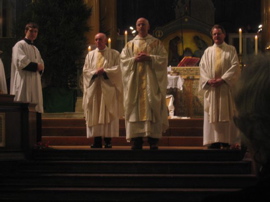 Unfortunately this cannot be legislated for. It cannot be imposed. It cannot even be taught. It must be caught, entered into as a grace, as pure gift. We have to receive the gift. Meditation, Fr John said, is the way we accept the gift of our being – and so, we might add, in the language of some contemporary theologians, become “gifted givers”. Those who receive must be sharers. Those who learn must teach. This explains why we are here today, representing groups and centres from so many parts of the world. To put it simply, as John Main had the gift of doing – meditation creates community. Not a club, not an institution, but community.
Unfortunately this cannot be legislated for. It cannot be imposed. It cannot even be taught. It must be caught, entered into as a grace, as pure gift. We have to receive the gift. Meditation, Fr John said, is the way we accept the gift of our being – and so, we might add, in the language of some contemporary theologians, become “gifted givers”. Those who receive must be sharers. Those who learn must teach. This explains why we are here today, representing groups and centres from so many parts of the world. To put it simply, as John Main had the gift of doing – meditation creates community. Not a club, not an institution, but community.
Many of us here today lead small meditation groups. There is a daily lunchtime group here at the cathedral as well as weekly evening groups. Some of us here are Benedictine oblates of The World Community – ordinary meditators who have found in the spirit of Benedict a way of “living out the consequences” of the daily pilgrimage to your heart. Many of you are teachers and have discovered that the simple teaching of meditation resonates beautifully with the simple mind of the child as well as helping to simplify the complicated turbulence of adolescence. At the Jesuit university of Georgetown in Washington, the new John Main Center for Meditation and Inter-religious dialogue has two daily periods of meditation in the middle of campus for students.
Many of you lead or participate in your groups in parishes, helping to renew this essential unit of Christian community with a contemplative dimension that touches every aspect of parochial life, structures, liturgy and ministry. A few of you are in the ordained ministry of your church and know that if ministry is to be service it must be grounded in deep personal prayer.
Some of you are in a 12 Step Recovery programme and have discovered the grace that accompanies addiction more fully through understanding better the meaning of the 11th Step – to raise your conscious contact with God through prayer and meditation.
Some of you carry heavy responsibilities in business, finance, the professions or public life and know how you must accept responsibility for your own inner balance and spiritual health if you are to discharge those responsibilities properly.
Most of you are supported by the sacrament of marriage and have learned from John Main that your own solitude, the inner room of your heart, must be respected if your capacity for relationship is to grow with your spouse or children.
Some of us here work for peace and justice, seeking to resolve conflict without violence and have discovered that only a contemplative consciousness can achieve that.
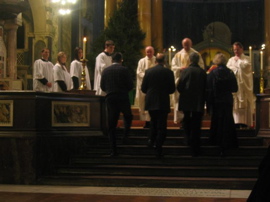 If you are involved in interfaith dialogue you know that meditation opens that mysterious common ground on which alone true, lasting friendship can be built in order to survive the problems of differences and the history of divisions. In caring for the dying, in the healing professions of medicine or therapy some of you have learned that a daily practice of meditation keeps you open, fresh and renews your capacity to listen and pay attention.
If you are involved in interfaith dialogue you know that meditation opens that mysterious common ground on which alone true, lasting friendship can be built in order to survive the problems of differences and the history of divisions. In caring for the dying, in the healing professions of medicine or therapy some of you have learned that a daily practice of meditation keeps you open, fresh and renews your capacity to listen and pay attention.
In other words prayer is our daily bread. We draw this sustenance from a well of infinite depth, deeper than our greatest thoughts or most powerful feelings can either reach or express.
So we have come here to celebrate one teacher who has taught many other teachers and who consistently pointed beyond himself and his own personality to Jesus as the teacher of teachers. “Call no one your teacher except the Christ.” We thank God for what has come to us through John Main and continues to flow into the renewal of the church and the world through him. We celebrate the fact that his personality was not isolated but integrated – those who knew him also knew better what holiness meant. He was deeply integrated with God in the very love that created and inspired him and was his motivating thirst and hunger.
His human gifts of personality, leadership, intellect and imagination were transformed over his lifetime by that love. We see in him therefore as in all the holy ones not just an object of our admiration but our own potential and true meaning. Seeing him, hearing his words, reading his books, helps to germinate the seed of contemplation in our own hearts and this leads us closer to fullness of being, true holiness, beyond our fears, anger, self-doubt or self-rejection.
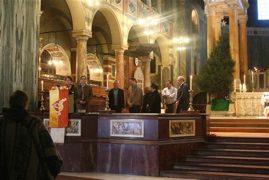 That is what we celebrate. But celebration is not a triumph. A Christian celebration does not lose sight of the weakness in which the power of God has to manifest. One aspect of the weakness is our vulnerability to accidents. The accident that meant the booklets for this Celebration today could not be delivered on time. The accident of cancer that took John Main away at the height of his human powers. Our groups, though growing, are fragile and usually small. Our community though expanding into new parts of the world, is fragile in administrative structures. At times this weakness and the mortality of the human condition can get us down. John Main learned to embrace his fate of an early death and turn it into a destiny of grace that radiated into the lives of others, but he also carried, like all of us probably, a certain sense of failure and disappointment.
That is what we celebrate. But celebration is not a triumph. A Christian celebration does not lose sight of the weakness in which the power of God has to manifest. One aspect of the weakness is our vulnerability to accidents. The accident that meant the booklets for this Celebration today could not be delivered on time. The accident of cancer that took John Main away at the height of his human powers. Our groups, though growing, are fragile and usually small. Our community though expanding into new parts of the world, is fragile in administrative structures. At times this weakness and the mortality of the human condition can get us down. John Main learned to embrace his fate of an early death and turn it into a destiny of grace that radiated into the lives of others, but he also carried, like all of us probably, a certain sense of failure and disappointment.
This weakness is also part of our celebration – what else does the Eucharist mean? And remembering this is part of the humbling, at times (if we resist the humbling) humiliating renewal of Christianity we were talking about earlier. It is essentially the humility of Christ that exposes and foreshortens all human pride. The humility of the mantra and our daily meditation. This way of meditation is not everyone’s path of course. There are other ways. But if you feel called to this you need to embrace it with the wholehearted commitment John Main challenges us to – because this is a way along with others that we serve the Body of Christ and do our bit for it.
The past 25 years make us aware of how God does work marvellously through individual teachers – and each of us is meant to be a channel of grace for others. Looking at the history of The World Community and its direction today we see the power of God operating through human weakness which means simply that it is God’s work we celebrate not just John Main’s. And if we really do see that then John Main will be happy and join us in the celebration with his great gift for communicating the joy of the Risen Lord.

Read the Homily in Spanish here.
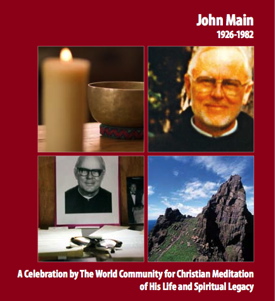
Download a PDF file of this special Eucharistic memorial celebration held at Westminster Cathedral, December 29, 2007 here.
Read memories by those who attended the Memorial Mass here.
(Painting of John Main by Brenda Bury; Montreal)

